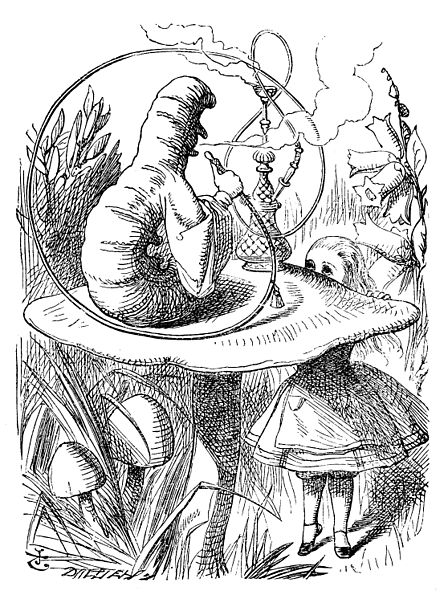 many different interpretations to the references made about the characters. Many people believe these references made throughout the story of Alice in Wonderland are all related to drugs. It's crazy but so true. When Alice drinks the potion to get small, Tweedle Dee and Tweedle Dum, and even the Caterpillar is the reference to drugs such as marijuana or LCD. What if these references are not about drugs but the reference to a medical condition known as Alice in Wonderland Syndrome. Has anyone ever thought of illnesses actually deriving from a fairytale! One example is the clip below explaining how one person interprets and deals with their condition.
many different interpretations to the references made about the characters. Many people believe these references made throughout the story of Alice in Wonderland are all related to drugs. It's crazy but so true. When Alice drinks the potion to get small, Tweedle Dee and Tweedle Dum, and even the Caterpillar is the reference to drugs such as marijuana or LCD. What if these references are not about drugs but the reference to a medical condition known as Alice in Wonderland Syndrome. Has anyone ever thought of illnesses actually deriving from a fairytale! One example is the clip below explaining how one person interprets and deals with their condition.
Alice in Wonderland Syndrome Clip
The clip from ABC News shows us a nineteen year old girl believes her world is either the size of a dollhouse or as big as a giant. People in the medical profession know the name of the illness came from the popular children’s story written by Lewis Carroll. The question is, why this name? Yes, Alice drinks a potion to shrink to enter Wonderland. Did Carroll suffer from this illness as well? I personally feel if an author can write something so in depth to bring their story to life, then they are connected to it somehow. “Speculations Carroll may have suffered from migraines and may have been in such a state while writing Alice” (Lu, 2009) has been suggested. Alice in Wonderland Syndrome (AIWS) is not caused by a malfunctioning of the eyes, but by an altered perception of images in the brain” (2009). The images people see have a distortion of either themselves, or their visual perception. In other words “the patients are unable to judge the size of everyday objects like cars and trees and are also unable to judge distances” (Lu, 2009).
The Symptoms & Treatments
Patients begin to notice severe headaches or migraines. Now because you may have a migraine now and then does not mean you have Alice in Wonderland Syndrome becasue everyone would have it. Often migraines of such severity run in families. “In fact, a person who experiences the symptoms of AIWS can sometimes interpret them as an indication of an oncoming severe migraine” (Lu, 2009). Patients do not realize there is a connection between the migraines and images until the images have already begun. There are some drugs to help eliminate migraines and not the ones in the story. “Non-steroidal anti-inflammatory drugs, such as ibuprofen, or drugs that activate serotonin receptors in the brain” can help treat migraines (Lu, 2009). Much progress has been made since the time of the first few publicized reports. As more research is done, hopefully we will know even more about AIWS.
A Negative or a Positive?
People believed the story Alice in Wonderland is all about drugs and hallucinations whereas they do not see the story as a positive for people who suffer with  Alice in Wonderland Syndrome. Does it give it a negative spin having a disease named after the popular children’s story? The speculation of drugs referenced throughout the story would have already negatively impacted it. While having a disease named after a beloved classic, may give people something to relate to, the story’s reception may be improved. If a person who suffers from Alice in Wonderland Syndrome would read the story of Alice in Wonderland, would they be able to accept and understand their disease better? I believe by relating to something they could understand, would better help them. Their world, “through their looking glass,” may be forever altered.
Alice in Wonderland Syndrome. Does it give it a negative spin having a disease named after the popular children’s story? The speculation of drugs referenced throughout the story would have already negatively impacted it. While having a disease named after a beloved classic, may give people something to relate to, the story’s reception may be improved. If a person who suffers from Alice in Wonderland Syndrome would read the story of Alice in Wonderland, would they be able to accept and understand their disease better? I believe by relating to something they could understand, would better help them. Their world, “through their looking glass,” may be forever altered.
Hamad1988. (2008). Alice in Wonderland Syndrome [video file]. Retrieved on October 7,
2009 from http://www.youtube.com/watch?v=vIUsdRwebPQ.
Lu, Yuanting. (2009). Health Talk: Alice in Wonderland Syndrome. The Tartan. Retrieved on
October 7, 2009 from http://www.thetartan.org/2009/1/19/scitech/healthtalk.

Well i just wanted too know more about the vertebra,
ReplyDeleteLike how does the vertebra get disconnected?